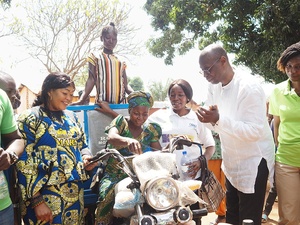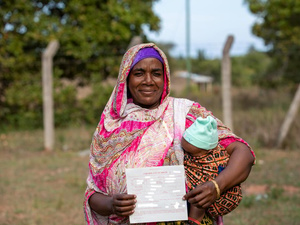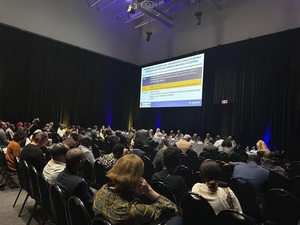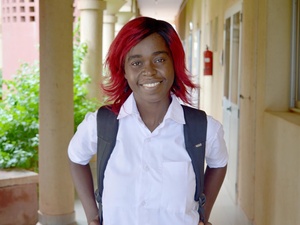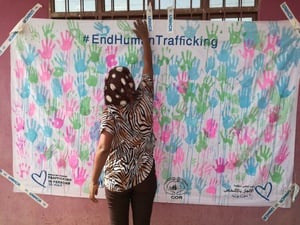Liberians flee rebel threat in refugee-hosting south
Liberians flee rebel threat in refugee-hosting south

Liberian refugees in Tabou transit camp, southern Côte d'Ivoire.
TABOU, Côte d'Ivoire, May 20 (UNHCR) - More than 10,000, primarily Liberian, refugees have arrived in Côte d'Ivoire in the last three days amid fears of rebel attacks in southern Liberia, prompting the UN refugee agency to appeal for the rebels to protect civilians, refugees and third-country nationals hosted in the conflict zone.
On Monday, rebels of the Movement for Democracy in Liberia (MODEL) reportedly captured Harper town in Liberia's south-eastern Mariland county. This followed last Thursday's reports that unknown attackers had tortured an official in neighbouring River Gee county, sending hundreds of villagers fleeing in fear.
Over the weekend, UNHCR's office in Tabou, southern Côte d'Ivoire, received reports of increased numbers of arrivals around Prollo, Pato Ide and other border crossing points. UNHCR teams were sent to the border, where they found many frightened civilians who had fled Liberia in a hurry after hearing rumours that the rebels were approaching. But none had seen any fighting. They crossed the Cavaly river into Côte d'Ivoire by boat.
Border monitors reported that gunfire was heard overnight Sunday and Monday morning on the Liberian side of the border, near the town of Plebo. UNHCR and its partners are monitoring the border and sending food and other assistance to the new arrivals. About 750 of them have been taken to a transit centre in Tabou, while most of the estimated 10,000 refugees are staying in surrounding villages.
The refugee agency has appealed to the rebel movement to respect and protect the civilian population, including thousands of refugees and third-country nationals who had found refuge in Harper after fleeing the crisis in Côte d'Ivoire.
The new refugee influx into Côte d'Ivoire unfolded as UNHCR chief Ruud Lubbers wrapped up his mission to West Africa on Sunday. During his trip, the High Commissioner strongly appealed for an end to the region's cycle of violence. In Liberia - where President Charles Taylor failed to show up for their scheduled meeting - Lubbers stressed that the time had come to find a political solution to a war that has displaced over one million people. Of these, 300,000 have been living for more than 10 years as refugees in neighbouring countries.
"The time has come to face reality: the situation in Liberia is unacceptable and going from bad to worse," said Lubbers at the end of his trip. "All the parties that are fighting in Liberia and in the west of Côte d'Ivoire have to agree to a cease-fire, lay down their arms, sit around the table and come to a political solution."
He added, "Power sharing is the only way forward. Only then can we plan for the return of refugees - Liberians to Liberia, Ivorians to the west of Côte d'Ivoire. And only then can we provide assistance without putting the lives of our humanitarian workers in danger."
In the five countries he visited, the High Commissioner met with thousands of refugees - mainly Liberian, but also Ivorian - who expressed their deep wish to return home.
"I left Liberia in 1991 and fled to the Parrot's Beak area in Guinea," said Mary, a 35-year-old mother of five. "In 2000, I had to flee again when rebels attacked the town I was living in. I decided to go to peaceful Côte d'Ivoire, where I lived for two years with my children in Danané. When another group of rebels attacked Danané in November last year, I had to leave again."
She eventually went back to Guinea, where she is one of the 19,000 refugees in Lainé camp. "I want to go home, but when?" she sighs.
Shocked and angered by the misery in a region forgotten by the international community, Lubbers highlighted the need to refocus the world's attention.
"The real needs of hundreds of thousands of displaced people are in Africa, not in Iraq," he said. "The international community has to start giving more substantial support to the refugee problems here."
He added, "Refugees should not be seen as a problem, but need to be included as a productive force that can contribute to the development and progress towards peace, not only in Africa, but everywhere in the world. We have to stop seeing refugees as miserable, and start seeing them as admirable and useful."


